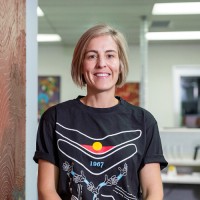 A disjuncture of world views: manifestation in burns care for Aboriginal and Torres Strait Islander children in Australia
A disjuncture of world views: manifestation in burns care for Aboriginal and Torres Strait Islander children in Australia
This research has made a positive and beneficial difference for Aboriginal and Torres Strait Islander children and families accessing the health care system.
Your research and what does winning this award mean to you?
It provides reassurance that my research was well executed and made a difference.
The results of my PhD research have impacted far and wide. The most notable and prominent impact was when Paediatric Burn Surgeon Professor Warwick Teague (Director, Trauma Service & Academic Paediatric Surgeon at The Royal Children’s Hospital, Melbourne) pronounced my research as the most important to his role in the 2018 year.
Professor Teague publically declared this at the 42nd Annual Scientific Meeting of the Australia and New Zealand Burn Association.
Another example of the reach of my research is the publication ‘Burns injury models of care: a review of quality and cultural safety for care of Indigenous children’ https://doi.org/10.1016/j.burns.2017.10.013, that had an immediate impact at one tertiary pediatric health services in Australia who invited me to contribute to the review and update of their model of care.
The potential translation of my research is further enhanced through it being part of a large NHMRC funded project. As a direct result of this multilayered and multidisciplinary project, my research results were presented at a national Policy Roundtable in March 2020. This has enabled real change in policy regarding burn care for Aboriginal and Torres Strait Islander children and ultimately improve the health outcomes of these children.
The five accepted (and two currently under review) publications in national and international peer reviewed journal will support this change in policy.
My research has been recognised both nationally and internationally at conferences and through being awarded best presentation at a 42nd Annual Scientific Meeting of the Australia and New Zealand Burn Association.
I was also invited to present two publications at the Congress of the International Society for Burn Injuries. This was held in India in November 2018. I was awarded three Best HDR student publications throughout the duration of my candidature. My thesis received high recommendations and recognition from the examiners. One examiner said: “The findings will be useful in improving the cultural safety and quality of burns care for Aboriginal and Torres Strait Islander children and families by challenging institutional racism and colonial ideologies within existing healthcare systems”.
Another very unique aspect of my research project was the methodology I engaged. My intense immersion in this research using Interface research methodology that cuts across both Western biomedical and Indigenous knowledge paradigm will support the work of other non-Indigenous researchers doing research with and for Indigenous people.
The potential impact of providing a documented account of a relatively unique methodology and exceptional example of adherence to sound ethical research principles is significant.
Insights of your time at Flinders University and where are you now?
I choose to study a PhD to support improvements in healthcare for Aboriginal and Torres Strait Islander children and families and to learn new skills in research, healthcare and culture. My advice for current or prospective PhD students is have something that you love to do (that is not related to your research) and engage with it. every. single. day. Mine was running.
Having access to experienced and highly skilled support individuals and structures that made my PhD even better. I chose to have four supervisors based on an explicit skill set. The skills reflected the intent and processes embedded in my research. They were deliberate and specific choices and I used each supervisor for their advanced skills and knowledge. I met with them as a group monthly, and individually fortnightly.
The impact of the research on professional and personal growth has been transformative.
Furthermore and most importantly, I have received numerous accounts of compliments from many of my Aboriginal colleagues.
Since being awarded my PhD, I have been successful in winning the position of Manager of the Quality Systems Teams at the Aboriginal Health Council of South Australia. https://ahcsa.org.au/staff/
I hope this will facilitate the ongoing impact and translation of my research into real outcomes for Aboriginal and Torres Strait Islander children.
I aim to work in strategic health policy for state or federal government in the future.

